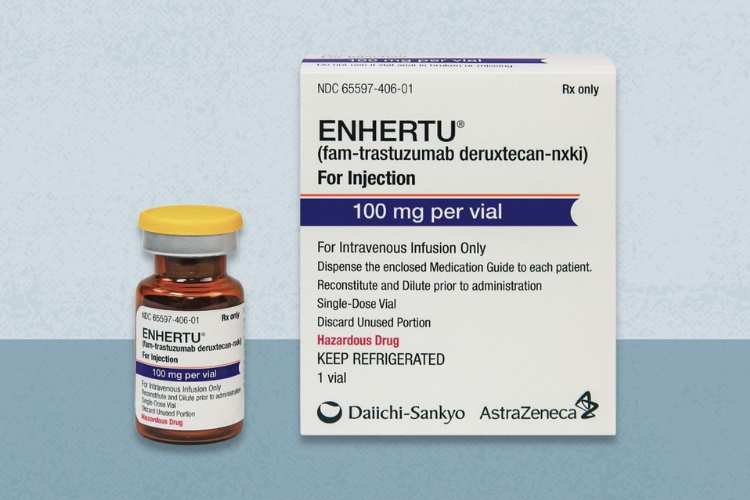Enhertu (trastuzumab deruxtecan) has received a positive recommendation for approval in the European Union (EU) as a standalone treatment for adult patients dealing with advanced non-small cell lung cancer (NSCLC). This recommendation is particularly significant for patients whose tumors possess an activating HER2 (ERBB2) mutation and require systemic therapy post platinum-based chemotherapy, with or without immunotherapy.
Enhertu is an engineered HER2-directed antibody-drug conjugate (ADC) jointly developed and commercialized by Daiichi Sankyo and AstraZeneca. The recommendation stems from primary findings in the DESTINY-Lung02 phase 2 trial, which were presented at the IASLC 2023 World Conference on Lung Cancer and concurrently published in the Journal of Clinical Oncology. The next step involves the European Commission’s review, as it holds the authority to grant marketing authorizations for medicines within the EU.
In the trial, Enhertu (5.4 mg/kg) demonstrated an impressive confirmed objective response rate (ORR) of 49.0% and a disease control rate (DCR) of 93.1% in patients with previously treated advanced or metastatic HER2 mutant NSCLC, as assessed by a blinded independent central review (BICR). Notably, one complete response (CR) and 49 partial responses (PR) were observed. The median duration of response (DoR) reached 16.8 months.
“ENHERTU is the first therapy to demonstrate a strong and durable tumor response in patients with previously treated HER2 mutant advanced non-small cell lung cancer, validating HER2 as an actionable target in lung cancer and supporting the potential to provide a much-needed option for these patients. This CHMP opinion is a positive step forward in advancing this HER2 directed antibody drug conjugate for these patients and we look forward to the European Commission’s decision.”
– Ken Takeshita, MD, Global Head, R&D, Daiichi Sankyo
Regarding safety, Enhertu at doses of 5.4 mg/kg and 6.4 mg/kg exhibited a safety profile consistent with other Enhertu trials, with no emergence of new safety signals. A favorable safety profile was observed specifically in patients treated with Enhertu at 5.4 mg/kg. Grade 3 or higher treatment-related adverse events (TEAEs) occurred in 38.6% of patients receiving this dose. The most common grade 3 or higher TEAEs included neutropenia and anemia. Additionally, treatment-related interstitial lung disease (ILD) or pneumonitis was reported in 12.9% of patients in the 5.4 mg/kg arm, predominantly of low grade.
Related: New Drug Enhertu Shows Promise For HER2-Mutant Lung Cancer Patients (IASLC WCLC 2023 Conference)
This recommendation marks a significant step forward in providing an effective treatment option for patients with HER2 mutant NSCLC within the EU, offering hope for improved outcomes and a potential shift in the therapeutic landscape.
“HER2 mutant non-small cell lung cancer is an aggressive form of lung cancer that often affects younger patients and has a poor prognosis, with limited approved therapies. This milestone recognizes the unmet need in the European Union and if approved, ENHERTU will provide the first targeted treatment option for these patients.”
– Susan Galbraith, MBBChir, PhD, Executive Vice President, Oncology R&D, AstraZeneca





























